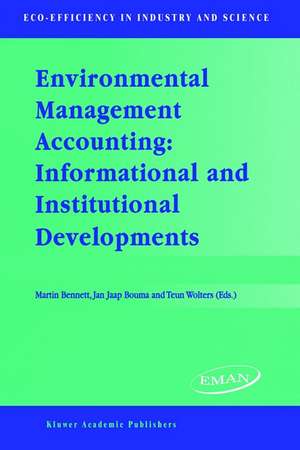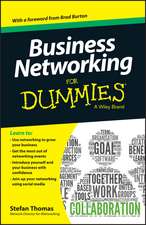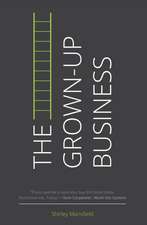Environmental Management Accounting: Informational and Institutional Developments: Eco-Efficiency in Industry and Science, cartea 9
Editat de M. D. Bennett, J.J. Bouma, T.J. Woltersen Limba Engleză Paperback – 31 iul 2002
This book gives a comprehensive coverage of the state of the art. It presents a number of EMA frameworks that companies can take as a basis for implementing their own specific EMA structures. Besides discussing environmental accounting issues within conventional management accounting, it gives a detailed picture of materials flow (cost) accounting as an alternative way of looking at the ecology-economy relationships at the corporate level. A fascinating case study shows how a large company (Siemens) applies materials flow accounting and what benefits it entails.
| Toate formatele și edițiile | Preț | Express |
|---|---|---|
| Paperback (1) | 945.47 lei 6-8 săpt. | |
| SPRINGER NETHERLANDS – 31 iul 2002 | 945.47 lei 6-8 săpt. | |
| Hardback (1) | 954.14 lei 6-8 săpt. | |
| SPRINGER NETHERLANDS – 31 iul 2002 | 954.14 lei 6-8 săpt. |
Din seria Eco-Efficiency in Industry and Science
- 9%
 Preț: 901.53 lei
Preț: 901.53 lei - 18%
 Preț: 951.29 lei
Preț: 951.29 lei - 15%
 Preț: 640.24 lei
Preț: 640.24 lei - 15%
 Preț: 654.77 lei
Preț: 654.77 lei - 15%
 Preț: 648.42 lei
Preț: 648.42 lei -
 Preț: 391.61 lei
Preț: 391.61 lei - 15%
 Preț: 642.51 lei
Preț: 642.51 lei - 15%
 Preț: 643.34 lei
Preț: 643.34 lei - 18%
 Preț: 957.62 lei
Preț: 957.62 lei - 18%
 Preț: 953.35 lei
Preț: 953.35 lei - 18%
 Preț: 1238.74 lei
Preț: 1238.74 lei - 18%
 Preț: 1224.68 lei
Preț: 1224.68 lei - 18%
 Preț: 963.15 lei
Preț: 963.15 lei - 18%
 Preț: 2115.07 lei
Preț: 2115.07 lei - 18%
 Preț: 1388.53 lei
Preț: 1388.53 lei - 18%
 Preț: 1855.88 lei
Preț: 1855.88 lei - 18%
 Preț: 1234.94 lei
Preț: 1234.94 lei - 15%
 Preț: 643.00 lei
Preț: 643.00 lei - 15%
 Preț: 647.40 lei
Preț: 647.40 lei - 18%
 Preț: 1222.01 lei
Preț: 1222.01 lei - 15%
 Preț: 637.59 lei
Preț: 637.59 lei - 15%
 Preț: 648.42 lei
Preț: 648.42 lei - 15%
 Preț: 646.62 lei
Preț: 646.62 lei - 15%
 Preț: 645.79 lei
Preț: 645.79 lei - 20%
 Preț: 590.95 lei
Preț: 590.95 lei
Preț: 945.47 lei
Preț vechi: 1153.02 lei
-18% Nou
Puncte Express: 1418
Preț estimativ în valută:
180.91€ • 197.13$ • 152.45£
180.91€ • 197.13$ • 152.45£
Carte tipărită la comandă
Livrare economică 23 aprilie-07 mai
Preluare comenzi: 021 569.72.76
Specificații
ISBN-13: 9781402005534
ISBN-10: 1402005539
Pagini: 316
Ilustrații: IX, 302 p.
Dimensiuni: 155 x 235 x 17 mm
Greutate: 0.45 kg
Ediția:2002
Editura: SPRINGER NETHERLANDS
Colecția Springer
Seria Eco-Efficiency in Industry and Science
Locul publicării:Dordrecht, Netherlands
ISBN-10: 1402005539
Pagini: 316
Ilustrații: IX, 302 p.
Dimensiuni: 155 x 235 x 17 mm
Greutate: 0.45 kg
Ediția:2002
Editura: SPRINGER NETHERLANDS
Colecția Springer
Seria Eco-Efficiency in Industry and Science
Locul publicării:Dordrecht, Netherlands
Public țintă
ResearchCuprins
The Development of Environmental Management Accounting: General Introduction and Critical Review.- Overviews.- An Integrative Framework of Environmental Management Accounting — Consolidating the Different Approaches of EMA into a Common Framework and Terminology.- Environmental Management Accounting Metrics: Procedures and Principles.- A Guideline for the Measurement and Reporting of Environmental Costs.- Flow Cost Accounting, an Accounting Approach Based on the Actual Flows of Materials.- Resource-Efficiency Accounting.- Information Systems.- Efficient Eco-Management Using ECO-Integral — How to Save Costs and Natural Resources at the Same Time.- Materials Flow Management Based on Production Data from ERP Systems.- ‘Counting what Counts’ — Raising Transparency through Environmental Management Accounting at Siemens.- The Danish Environmental Management Accounting Project: An Environmental Management Accounting Framework and Possible Integration into Corporate Information Systems.- Life Cycle Engineering.- Ema Policies.- Corporate Environmental Accounting: A Japanese Perspective.- Environmental Accounting in Korea: Cases and Policy Recommendations.- Government Strategies to Promote Corporate Environmental Management Accounting.- Looking for Knowledge Management in Environmental Accounting.- The Greening of Accounting: Putting the Environment onto the Agenda of the Accountancy Profession in the Philippines.- Different Ema Perspectives.- Environmental Performance Measurement.- Towards Sustainability Indicators for Product Chains.- Towards Transparent Information on the Environmental Quality of Products — LCA-based Data Production for the Finnish Foodstuff Industry.- Prospective Analysis for Implementing an Environmental Management System in Pig Farms: LikelyRole of an Environmental Management Accounting System.- Environmental Management Accounting and the Opportunity Cost of Neglecting Environmental Protection.- Wanted: A Theory for Environmental Management Accounting.
Recenzii
"As contributions in this volume come not only from researchers but also from the industry and governmental organizations, the text is very rich in terms of references to real cases and authenticity, but occasionally at the cost of congruence and harmony. Having said that, I would recommend this book to anyone interested in environmental accounting. I would also suggest to read this book keeping a critical eye on EMA, as some of the authors do."
(European Accounting Review, 13:1 (2004)
(European Accounting Review, 13:1 (2004)
Caracteristici
Includes supplementary material: sn.pub/extras













